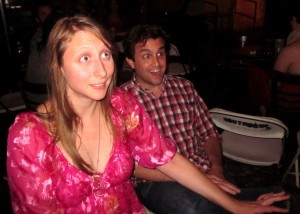Books & Culture
REVIEW: The Art of Fielding by Chad Harbach

The Art of Fielding
Chad Harbach
Little, Brown
512 pages/$25.99
In the middle of Chad Harbach’s debut novel, a character wonders why anybody should care about Henry Skrimshander, “a silly kid with a silly problem” and the character around which the book’s plot revolves. Henry’s problem is silly. A college shortstop who’s hustled and sweated himself into a legitimate draft prospect, he finds himself incapable of consistently tossing a baseball to first base after his throwing error severely injured his bench-riding roommate. Had the game not been called on account of player hospitalization, the misfire would have gone into the annals and officially ended Henry’s record-tying streak of errorless innings.
The Art of Fielding’s 500 pages are focused on life at Wisconsin liberal arts college, seen largely through the eyes and minds of two ballplayers, the institution’s president, and his daughter. While Henry is the centerpiece, this ensemble gives the book breadth and breath. The narrative unfolds in the third-person, but Harbach tucks the reader comfortably inside one of those four characters’ heads for a chapter at a time. Because it’s superbly written, a reader does care about Henry Skrimshander and his problems, and the same is true for each of Harbach’s characters and each of their problems, silly or not.
This is no baseball novel, at least not the kind with which we’re familiar. Baseball fiction — let’s face it — typically disappoints. The on-the-field action rarely feels right to readers who know the game, and the happenings away from the diamond often serve as filler. Most “good” baseball novels — Shoeless Joe, The Natural for example — avoid this pitfall by relying on a corn-syrup narrator’s voice that requires the reader to be in touch with her most sentimental fandom if the book is to be enjoyed. Philip Roth’s The Great American Novel survives by mocking the genre and paying homage to great non-baseball books. David James Duncan’s The Brothers K succeeds because its players aren’t just players — they’re carefully developed characters who face the trials of real life.
The Art of Fielding, like The Great American Novel, lovingly plays with canonical fiction (Moby-Dick is a shared obsession), but takes a different road than Roth’s sendup by avoiding altogether the cliches of baseball fiction. Harbach’s phenom isn’t a natural or mystically aloof orphan. These tropes are deliberately dismissed in the opening pages. In one memorable early scene, Henry does something more mythic heroes never do: practices taking ground balls, works to master his position. The author is quick to introduce the ho-hum South Dakota family that produced the boy, too. Heck, Henry can’t even hit in the beginning of this story.
Harbach, a cofounder of n+1, writes about baseball knowledgeably enough and with the right amount of details to please the fan without isolating the non-fan (“Starblind wheeled around third at sprinter’s speed and slid home as the throw veered off target.”), and his depiction of contemporary college players spares him the temptation to get misty-eyed about the beauty of the game. His bats, being aluminum, “ping” rather than “crack.”
When the plot calls for a two-out, walk-off hit, Harbach doesn’t have his batter rub his hands in the dirt while shooting the pitcher the evil eye, doesn’t have that pitcher wipe the sweat from his brow, and sometimes doesn’t even have his batter get the hit. Former Major Leaguers who’ve struggled with throwing problems similar to Henry’s are referenced rather than ignored; the shortstop nearly punches a college reporter when she asks him about Steve Sax.

For all the ways Harbach’s book is a strong baseball read, its real victory is in tying what happens on the field to a more complex narrative, relatable to almost anybody. Like The Brothers K, it concerns itself with problems that have little to do with strikeouts and plenty to do with the pain of learning and the pain of love. The Art of Fielding is fascinated by the four years after childhood and before adulthood, whether a character spends them in college, at sea, or in a troubled marriage.
The growth these characters experience resonates more deeply than you’d expect from a baseball novel, and their meditations on suffering are too much fun to have come from a coming-of-age or college novel. The Art of Fielding refuses to get mucked down by genre and instead tells a story that, yes, happens to deal with baseball and, yes, features characters on the cusp of actualization. The result is a terrific book.
***
— Josh Jackson covered Minor League Baseball for three years. He’s currently an Assistant Lecturer at the University of Southern California, where he’s also enrolled in the MPW Program.









